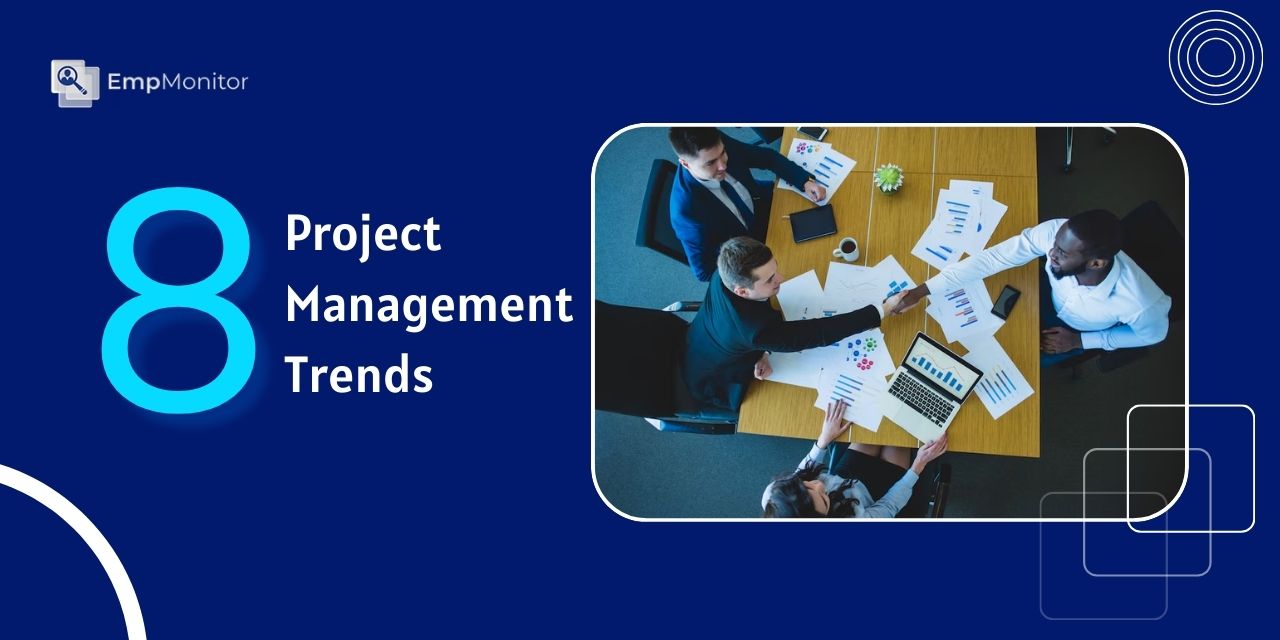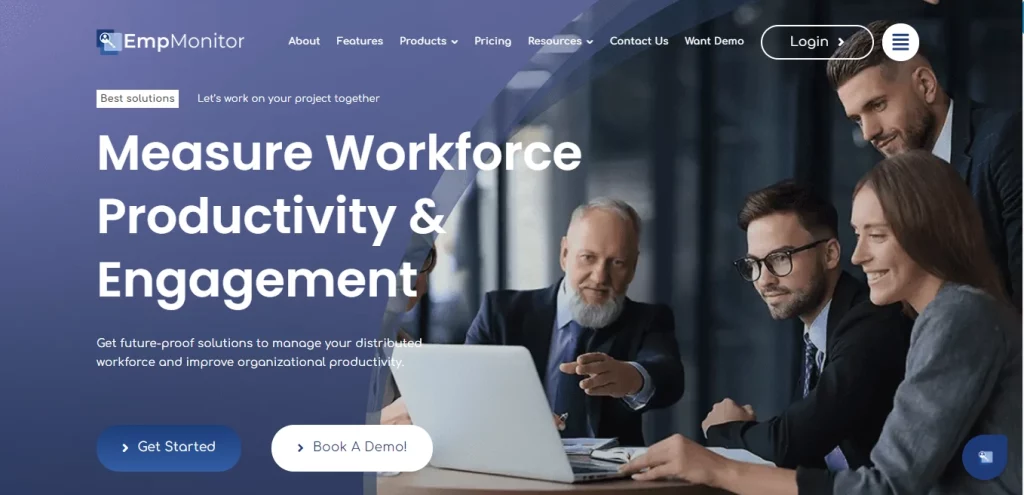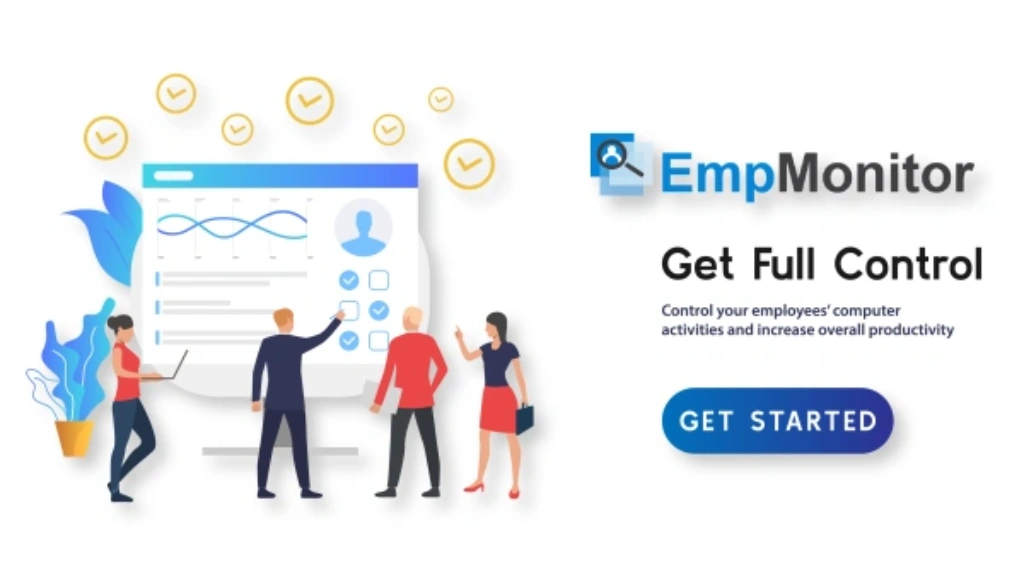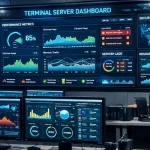As project management trends evolve, new technologies emerge, methodologies refine, and best practices shift to adapt to the changing business climate. In 2024, the field is transforming due to technological advancements, changing workforce dynamics, and evolving market demands. Staying ahead of these changes is crucial for maximizing team efficiency and project success. Join us as we explore the future trends shaping the world of project management.
Listen To The Podcast Now!
8 Latest Project Management Trends:
These trends will help you stay ahead of the curve and ensure project success.
Now, introducing the latest advancements shaping project management trends in 2024 –
Use Of AI In Project Management:
AI and Automation Take Center Stage
Today, the influence of AI in project management trends is undeniable. We’ll see AI-powered tools automate repetitive tasks, freeing up valuable human resources for strategic thinking and complex problem-solving.
Here are some exciting ways AI is transforming project management:
- Resource Allocation and Scheduling: AI algorithms can analyze past projects, team skills, and workload to optimize resource allocation and scheduling. It translates to better team utilization and improved project timelines.
- Risk Management: AI can identify potential risks early by analyzing historical data and current project trends. This proactive approach allows project managers to take preventive measures and mitigate risks before they derail progress.
- Predictive Analytics: AI can predict project roadblocks and potential delays, empowering project managers to make data-driven decisions and course corrections before issues escalate.
2. Hybrid- Project Management Trends:
In 2024, project management is all about flexibility and adaptability. The hybrid approach, which combines elements from various methodologies like Agile, Waterfall, and Lean project management, is gaining significant traction. It allows project managers to tailor their approach to the specific needs of each project, ensuring optimal efficiency and effectiveness. Let us understand these in detail.
Waterfall Project Management
Waterfall project management is a step-by-step approach where each phase of a project must be completed before moving to the next. This method focuses on thorough planning and clear documentation, making it best for projects with well-defined requirements. While it offers predictability, it can be inflexible if changes are needed once the project starts.
Agile Project Management
Agile project management is a flexible approach that breaks projects into small, manageable units called sprints, typically lasting 2-4 weeks. It emphasizes continuous improvement and customer feedback, making it ideal for projects with changing requirements. Agile encourages collaboration and quick responses to changes, delivering value incrementally to clients.
Lean Project Management
Lean project management focuses on efficiency and eliminating waste by streamlining processes and reducing costs. It aims to improve quality and value by continuously identifying and removing non-essential activities. This method is best for projects seeking to optimize resources, enhance efficiency, and deliver high-quality results with minimal waste.
By adopting elements from these methodologies, you can manage your project efficiently and effectively.
Here is why such project management trends approach is gaining popularity:
Increased Project Success: By selecting the best aspects of different methodologies, project managers can address the unique challenges of each project and maximize success rates. This adaptability improves the likelihood of achieving project objectives and delivering results on time and within budget.
Improved Team Productivity: A flexible approach allows teams to adapt to changing circumstances and work styles, leading to increased productivity and overall satisfaction. By being agile in their approach, teams can optimize workflows, swiftly address emerging issues, and proactively mitigate potential delays. This proactive adjustment not only boosts overall efficiency but also ensures that teams remain aligned with project goals and deliverables, thereby enhancing productivity across the board.
Enhanced Stakeholder Engagement: These methodologies emphasize continuous stakeholder involvement and feedback, promoting transparency and alignment with stakeholder expectations. By integrating these practices into a hybrid approach, project managers can foster better communication and collaboration with stakeholders throughout the project lifecycle.
3. Communication is Key: Reimagining Communication Strategies For The Modern Workplace
Effective communication is becoming essential in project plans, enhancing overall project planning. Effective communication has become a cornerstone of successful project management. By reimagining communication strategies, teams can ensure clarity, reduce misunderstandings, and enhance overall project planning.
Here are some key project management trends in communication:
The Rise of Asynchronous Communication: With geographically dispersed teams and flexible work arrangements becoming increasingly common, asynchronous communication tools are essential. Project management software with features like built-in messaging platforms, task tracking, and project collaboration tools are crucial for seamless information sharing.
Embracing Transparency and Visibility: Open and transparent communication fosters trust within teams and improves overall project health. Project managers are utilizing real-time project dashboards and communication platforms to keep everyone informed and on the same page.
Empowering Effective Feedback: Project managers prioritize two-way communication to create a feedback culture. Regular check-ins, team meetings, and anonymous feedback tools encourage open communication and allow for continuous improvement.
4. Data-Driven Project Management Trends
Data-driven project management is becoming the norm in 2024. Project managers leverage data to gain deeper insights, track progress more effectively, and make informed decisions.
Here’s how data is transforming project management trends:
Performance Measurement: Data empowers project managers to measure progress and identify areas for improvement accurately. Project performance dashboards provide real-time insights into key metrics like budget adherence, resource utilization, and task completion rates.
Informed Decision-Making: Data analysis helps project managers make informed decisions based on concrete evidence rather than guesswork. This data-driven approach leads to better resource allocation, improved risk management, and higher project success rates.
Improved Communication and Collaboration: Data visualization tools can present complex data clearly and concisely, fostering better communication and team collaboration. Data-driven discussions lead to a shared understanding of project status and priorities.
5. The Growing Need For Leaders With Emotional Intelligence
There is an escalating demand for leaders with higher emotional intelligence (EI). Emotional intelligence refers to the ability to recognize, understand, and manage one’s own emotions and to perceive and influence others’ emotions effectively. These project management trends stem from several key factors:
Changing Workforce Dynamics: As workplaces become more diverse and inclusive, leaders must navigate a broader range of personalities, backgrounds, and communication styles. Emotionally intelligent leaders can build strong relationships, foster collaboration, and resolve conflicts in multicultural and multidisciplinary teams.
Enhanced Team Performance: Research has shown that teams led by emotionally intelligent leaders demonstrate higher levels of engagement, creativity, and productivity. These leaders create an environment where team members feel valued, motivated, and supported, leading to improved performance and results.
Effective Decision-Making: Emotionally intelligent leaders are adept at making sound decisions under pressure, considering rational analysis and empathetic understanding. They can weigh the emotional impact of their choices on individuals and stakeholders, leading to more informed and balanced decision-making processes.
Resilience and Adaptability: In today’s volatile and uncertain business environment, leaders must be resilient and adaptable in the face of challenges and setbacks. Emotionally intelligent leaders can manage stress, bounce back from failures, and inspire confidence in their teams during times of change and uncertainty.
Enhanced Employee Well-being: Leaders with high emotional intelligence prioritize their employees’ well-being and mental health. They create a supportive and inclusive work culture where individuals feel safe to express their emotions, seek help when needed, and maintain a healthy work-life balance.
Also Read
How To Manage Multiple Projects Effectively – 9 Powerful Tips
How To Determine Which Workforce Management Software Is Best For Your Business?
6. Modern Project Management Tools And Software
Modern project management tools and software like EmpMonitor are your trusty assistants in managing a project. They’re like having a team of experts at your fingertips, helping you stay organized, communicate effectively, and track progress every step of the way. Here’s why it can be your asset in project management trends:
EmpMonitor – Project Management Tool
EmpMonitor is an advanced employee monitoring and project management tool designed to streamline team and project management. With EmpMonitor, you can easily oversee your teams and projects from anywhere. Let’s dive into its advanced features that keep you ahead in managing your workforce and staying on top of project management trends:
Time Tracking
Keep a close eye on every minute of your employees’ working hours to eliminate unnecessary time gaps and boost productivity.
Project Management
You can efficiently plan, organize, and oversee entire projects using top-notch task management software, allowing you to supervise and manage multiple projects simultaneously. Here are some of its features:
- Control Project Module – Take full control of your Project Module – easily create, edit, search, filter, and generate downloadable reports (CSV/PDF).
- Kanban Boards And Gantt Charts – Its versatility includes productivity tracking, project insights, remote management, and boosting workforce efficiency.
- Customized Access Level – Customize permissions for each member to ensure appropriate access.
- Role assignment – Assign specific roles and responsibilities with clarity for each team member.
Screenshots
It enables you to automatically capture screenshots at customizable intervals to gain insights into workflow details, all conveniently displayed on a single dashboard for better evaluation.
Chat Monitoring
Enhance your team’s focus by monitoring the total time spent on chat and social apps during working hours.
Insightful Reports
Visualize employee engagement and conduct thorough team analysis with visually rich analytical reports and automated timesheets.
Data Security
Maintain constant vigilance over employee actions to ensure the security of company data and prevent data theft.
Incorporate workforce management software like EmpMonitor and execute your project management faster and smoother. It can help you to get up to date with the latest project management trends.
Conclusion
The top trends in project management for 2024 cover a wide range of areas, including the use of AI and automation, the focus on remote work, and the adoption of hybrid methodologies. Effective communication strategies, data-driven decision-making, and the growing importance of emotionally intelligent leaders are key elements shaping the future of project management.
Modern project management tools and software like EmpMonitor are essential for facilitating seamless project execution and adapting to emerging trends. By embracing these project management trends and leveraging innovative solutions, project managers can confidently navigate modern projects’ complexities and achieve greater success.
If you have any questions or need clarification, be sure to check out the FAQ section in the blog for detailed answers and helpful information.
FAQs
What are the top 3 elements of project management?
The project management triangle is defined by three critical factors: scope, time, and cost. This framework highlights the interplay between these constraints and emphasizes balancing them to ensure a high-quality final product.
What Defines a Strong Project Manager?
A successful project manager knows how to clearly define a project’s scope, identify required resources, and effectively schedule those resources—key technical skills for the role. Additionally, they must engage with stakeholders and ensure that projects align with business objectives, showcasing their abilities in interpersonal and strategic areas.
What is the future of project management?
PMI and Anderson Economic Group forecast a 33% increase in project-oriented jobs across 11 countries. The need for skilled project managers is rising, and by 2027, businesses will require 87.7 million professionals in project management roles.














